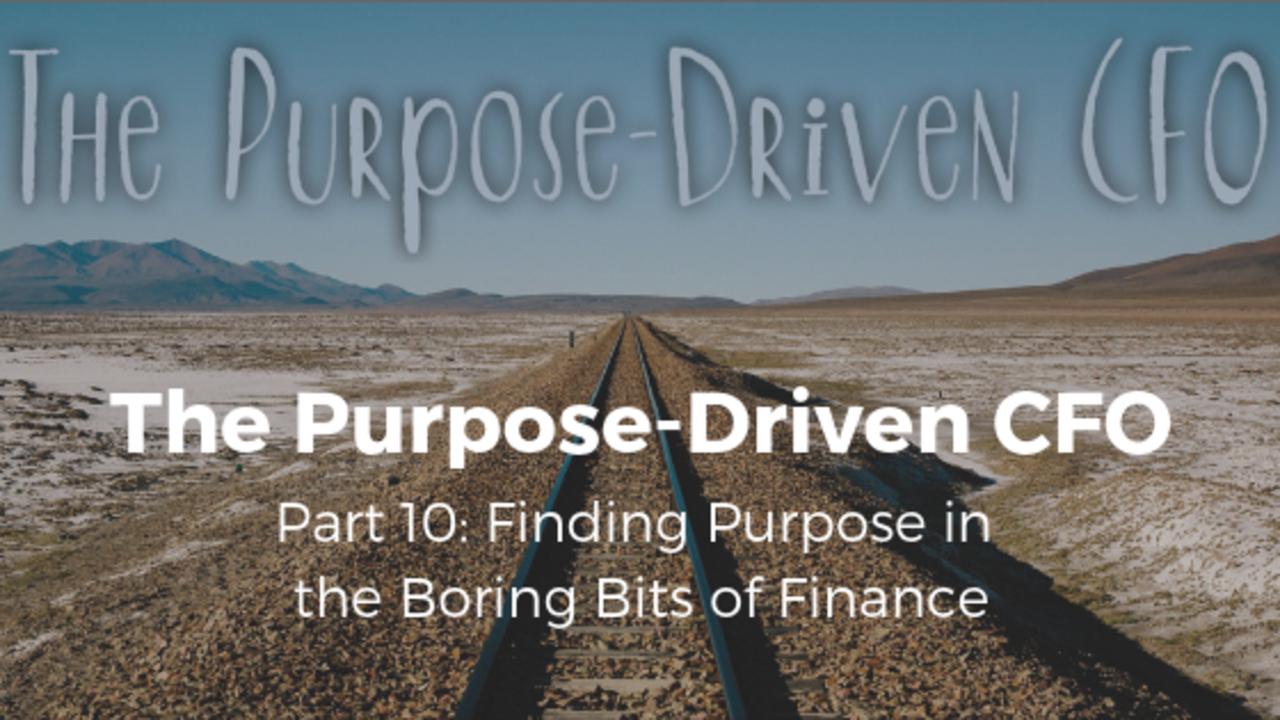The Future CFO – 4 Ingredients for CFO Success in the Modern Age

By Andy Burrows
[Published 23rd July 2018, edited 20th September 2018]
To be successful the future CFO will need to be all about mindsets and methodologies.
My presentation at the AICPA-CIMA Finance Transformation conference in London this year would have been entitled, “the DNA of the future CFO”.
And since I now can't do the talk because I'm having cancer treatment, I'm letting you know my basic thesis, right here!
But am I out of step?! I mean, surely the future CFO is going to be all about digital technology, automation and predictive analytics? Well the Finance Transformation conference is hearing plenty of perspectives on all those things from people more qualified than me!
Would you like to hear a different perspective? I knew you would! Here we go...
So, here’s what I mean by mindsets and methodologies. Four essential ingredients for being a successful CFO in the future. Four parts to the DNA of the future CFO.
1. The future CFO must have a leadership mindset
Firstly...
How to Define Value Drivers – a Simple Technique for Business Strategy and Performance Measurement

By Andy Burrows
[First published July 2018; updated July 2021]
In this article I want to introduce you to a very simple tool called the “value driver tree”.
Why you need a value driver tree
Getting business strategy right is not easy.
The definition of strategy is simple enough: “a plan of action to achieve an aspiration or overcome a problem”. And the process of arriving at the plan sounds so easy: define the objective (vision, aspiration, problem), assess the current state and therefore the gaps, and decide how to get from where you are to where you want to go.
One of the things that makes it difficult is knowing where to start in assessing the current state. There are so many factors you could take into account. It’s sometimes difficult to see the wood for the trees.
And performance measurement has similar issues. I’ve written previously about the need to make sure you’re looking at the right performance measures – KPIs – rather than just any old data (just because you can ge...
How to Develop KPIs That More Than Count

By Andy Burrows
[First published 7th September 2017]
This article looks at how to go about developing Key Performance Indicators (KPIs).
If you’re interested in this topic enough to start reading, you’ll know that KPIs give you a richer view of performance than the normal accounting stuff that we produce in Finance. You’re also probably painfully aware that there are so many metrics to choose from. And that can make you wonder whether you’re looking at the right things.
So, the common question is, how can we develop the right KPIs?
But, before we get to that, I want to do through three things:
- Give a simple definition of a KPI
- Clear up a couple of misconceptions
- Take a stab at a description of what a good KPI is
That should head us in the right direction…
What are KPIs?
A simple definition of a Key Performance Indicator is that it’s just a specific way of seeing how well things are going with something. That sounds quite general, but I’ve started that way deliberately, s...
Are Your Monthly Reports Leading The Business Astray?

By Andy Burrows
[First published 29th March 2018]
I remember hearing the old sayings about performance measurement early on in my career, and thinking they were pretty astute – catchy and encapsulating a profound truth. Things like:
“If you don’t measure it, you don’t manage it!”
“What gets measured gets done!”
And I’ve always taken them to mean something positive – if you really value your objective, then measure your progress towards it. If you’re not measuring it, it shows you don’t really care. So, if you really do care, and you want it to get done, then measure it, report it, etc.
But recently that last one – “what gets measured gets done” – has been making me think. There’s a negative side to it as well.
The way you drive
The truth of that saying – “what gets measured gets done” – struck me when I drove my son’s Merc once.
The dashboard has a mode to show how economically you are driving. It lights up green in different segments if you’re driving in ways that maximise fu...
Why I'm Not a CFO! - A Career Planning Reality Check

By Andy Burrows
[First Published 7th March 2018]
If you’ve read any of my articles, you may well have wondered why I’m not a CFO by now. I presume to talk about the Finance function. I talk as if I know what the Finance function should be, and how it should be run. I’ve had many senior roles in my career in Finance over the last 20 years. So, why am I not a CFO by now?
So, I thought I’d tell you a little of my story.
And as you read, you’ll realise two things:
- I didn’t follow all the advice I gave in my article about how to plot a course to the CFO role you've always wanted, giving tips to plot a career path to be CFO one day. Much of that advice is based on reflecting on what I did, what I should have done, and what I’ve learned from other people. And,
- No one is entirely in control of their own future.
So, the fact that I haven’t attained a CFO position isn’t because I haven’t tried to, didn’t want to, or wasn’t good enough. I actually think I’d make a fairly decent CFO, Fi...
Andy Burrows Featured on the Strength in The Numbers Show

By Andy Burrows
[First published 8th February 2018]
When Andrew Codd asked me if I'd be a guest on his new podcast, The Strength in the Numbers Show, I was excited.
I connected with Andrew on LinkedIn quite soon after starting Supercharged Finance, late in 2016. He and Anders Liu-Lindberg seemed to be having some good online discussions about Finance business partnering, which I’d already written about. And Andrew had recently published his book about the subject, The Audacious Finance Partner.
I was partly excited because I’ve never been interviewed before, except for jobs!
Networking Backwards
But the main reason for my excitement is that I’m getting a real buzz out of the connections I’ve made through Supercharged Finance.
Before the end of 2016, I was one of those who wouldn’t connect with people on LinkedIn unless I’d at least spoken to them. I’d reject random connection requests from people, or at least be suspicious, especially of recruitment consultants!
But in deciding...
Why Financial Modelling Skills Will Be A Big Career Door Opener For Emerging Accounting and Finance Talent

This article is written by financial modelling specialist, Lance Rubin. You can find more of Lance's work at https://www.modelcitizn.com/
Background
If you have recently been for a job interview or at least just taken a small peek through the door called opportunity then you may have noticed something emerging regarding a new key skill requirement, which you may or may not have.
Irrespective of your level, financial modelling skills have become one of the most highly sought after for finance professionals today.
Good news for candidates is there is short supply and huge demand. There was certainly no shortage of opportunities when I was looking for a job recently, but I decided to use this shortage to consult to many different companies rather than just one as their employee.
Bad news is if you are in a finance team and never built or know what a 3-way model is, then you have lots to learn and to catch up on. A 3-way model refers to the 3 financial statements namely an Income Stat...
Driver Based Planning and Forecasting in the Context of FP&A

This article is written by financial modelling specialist, Lance Rubin. You can find more of Lance's work at https://www.modelcitizn.com/
Background
When I first came across the term driver based planning and forecasting I was confused.
As an ex-investment banker having joined a Finance team the concept of drivers when talking about a forecast or plan was simply assumptions.
Why was it not called just that? Assumptions! Investment bankers have been building models with assumptions ever since the first model was built and a corporate transaction was negotiated.
So what’s all the excitement about driver based planning. It’s simply a financial model with assumptions to drive decisions..no?
Driver Based vs Assumption Based
Why give assumptions a different name i.e. a driver, why not just call it assumption based planning?
Ultimately a plan or a forecast is a collection of assumptions both in the numbers that are input into the model but also assumptions around logic construction, w...
Financial Modelling: Diamonds in the Rough

This article is written by financial modelling specialist, Lance Rubin. You can find more of Lance's work at https://www.modelcitizn.com/
Background
Why is it so hard to find Finance staff with good financial modeling skills?
Surely all accountants and professional finance people are good financial modelers?
When I was leading a large team within the Finance function of a major Australian bank it was difficult to find good modeling skills.
This isn't just a skills gap in banks but across all Finance teams in corporates and small to medium sized entities.
It's nobody’s fault, we were never trained and everyone just got tips off the resident "Excel expert" in the team. There is always one...Or we used Google and learnt from Chandoo and YouTube videos to solve problems in spreadsheets….just like you solve anything really…YouTube saviour.
When joining a company it was expected that everyone knew how to use Excel with a high degree of competency in Financial Modeling.
But the proble...
The Purpose-Driven CFO Part 10: Finding purpose in the boring bits of Finance

By Andy Burrows
[First published 26th December 2017]
[This article is also on LinkedIn - why not "Follow+" Andy and give the article a "like"?]
I haven’t written in this series for a while. So, for new readers, I’ll just briefly reiterate the premise of The Purpose-Driven CFO.
What I set out to do was to investigate what difference it makes going back to first principles with the things we do in Finance, and asking “why?” I know from experience that understanding why we do things can increase our motivation in doing them. Once you can see the end goal, and see the benefits of that goal, any tedious, mundane, difficult or complex steps towards it become less burdensome. And often asking “why” reveals implications that will change the way we do things. That has certainly been the case with all the other areas I’ve looked at from this angle.
You can find links to the previous articles at the end.
What I’m considering today is what I’m calling the “boring bits”. Sorry if anyone fin...




